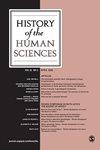罪的体现:牧师精神病学家Asser Stenbäck和人类问题的心身方法
IF 0.5
2区 历史学
Q2 HISTORY & PHILOSOPHY OF SCIENCE
引用次数: 0
摘要
结合神学和医学的观点是必不可少的历史研究之间的相互联系的思想,身体和灵魂。本文通过芬兰身心医学的历史探索了这些关系,并使用出版和档案材料来研究芬兰-瑞典神学家精神病学家Asser Stenbäck(1913-2006)的知识传记。Stenbäck的职业生涯,从牧师发展到精神病学和政治,揭示了宗教和医学之间的紧张关系,影响身心医学的精神和科学团体,以及健康和基督教道德如何相互联系的想法。采用传记的方法来挖掘医学概念中编码的价值观,并通过这一点,指向健康-宗教关系的另一个未被探索的维度。除了情感方面,宗教教义还旨在组织生活并赋予其意义。Stenbäck的思想通过在世俗医学时代捍卫世界的非理性主义基础,将这些经验和规范领域联系在一起。他的作品说明了信仰的内在体验如何在医学上和政治上都具有目的。为了更好地理解神学、医学和政治世界如何在涉及人类问题时进行对话,在历史研究中结合这些观点也是值得的。本文章由计算机程序翻译,如有差异,请以英文原文为准。
Sin embodied: Priest-psychiatrist Asser Stenbäck and the psychosomatic approach to human problems
Combining theological and medical perspectives is indispensable for the historical study of the interconnections between mind, body, and soul. This article explores these relations through the history of Finnish psychosomatic medicine, and uses published and archival materials to examine the intellectual biography of the Finland-Swedish theologian turned psychiatrist Asser Stenbäck (1913–2006). Stenbäck's career, which evolved from priesthood to psychiatry and politics, reveals a great deal about the tensions between religion and medicine, the spiritual and scientific groups that impinged upon psychosomatic medicine, and ideas on how health and Christian morality were interconnected. The biographical approach is adopted to unearth the values encoded in medical concepts, and through this, to point towards another, underexplored dimension of the health–religion relationship. In addition to their emotional aspect, religious doctrines are intended to organise life and give it meaning. Stenbäck's ideas tied these experiential and normative spheres together by defending an irrationalist substratum of the world in the secular age of medicine. His work illustrates how the inner experience of faith can become both medically and politically purposive. It is worth combining these perspectives in historical research as well in order to better understand how the theological, medical, and political worlds are in dialogue when it comes to human problems.
求助全文
通过发布文献求助,成功后即可免费获取论文全文。
去求助
来源期刊

History of the Human Sciences
综合性期刊-科学史与科学哲学
CiteScore
1.60
自引率
11.10%
发文量
31
审稿时长
>12 weeks
期刊介绍:
History of the Human Sciences aims to expand our understanding of the human world through a broad interdisciplinary approach. The journal will bring you critical articles from sociology, psychology, anthropology and politics, and link their interests with those of philosophy, literary criticism, art history, linguistics, psychoanalysis, aesthetics and law.
 求助内容:
求助内容: 应助结果提醒方式:
应助结果提醒方式:


